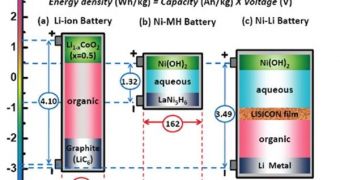In a groundbreaking, new research, experts at Japan’s National Institute of Advanced Industrial Science and Technology (AIST) have developed a new type of batteries, containing nickel and lithium, which can hold 3.5 times more energy than the average lithium-ion battery and is also much safer to boot. That is to say, the lithium-ion variety tends to catch fire and explode under certain conditions, and electronics manufacturers have been looking for a way around that for a long time.
Granted, the contribution that lithium-ion batteries made to the electronics industry should not be understated. They heralded a new era of devices, such as mobile phones and laptops, and have contributed significantly to the development of the electric-car industry. They are able to hold an average total of 55 watt hours of energy per pound, whereas an electric car needs 25 kilowatt hours (kWh) of power to go 100 miles. This means that an impressive amount of batteries is needed, if a company is to make its cars worthy of traveling at least a few hundred kilometers per charge.
In their new research, AIST investigators combined LISICON, a newly developed, special, glass-ceramic film, with Lithium and Nickel, two chemicals that would not normally go along well together. The result is the world's first Ni-Li battery, which combines, in its creators' view, the best of both worlds, and then some. In addition to being able to hold a lot more electricity than other batteries, the innovation is also able to continue on functioning in conditions where Li-ion batteries would “fire up.”
One of the major drawbacks that the new batteries have is the fact that they are produced through a fairly complex process. This can either mean that the technology will be implemented later, when the costs will have run down, or that it will be produced as fast as possible, but at high prices. However, its uses are obvious. For example, an electric car needs 500 pounds of Li-ion batteries for every 100 miles of range. The Tesla Roadster has 1,000 pounds of batteries and runs 200 miles. With 1,000 pounds of Ni-Li batteries, it could run for 700 miles, Gas 2.0 reports.

 14 DAY TRIAL //
14 DAY TRIAL //